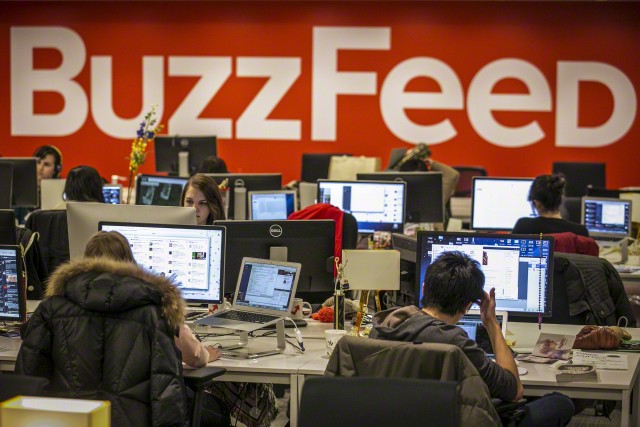Why BuzzFeed's ethics guide is an incoherent mess
Some kinds of political partisanship are bad. Others are good. How come?


A free daily email with the biggest news stories of the day – and the best features from TheWeek.com
You are now subscribed
Your newsletter sign-up was successful
BuzzFeed recently got in a bit of hot water over one of its reporters' tweets endorsing gun control in the aftermath of the mass shooting in Louisiana. Opponents of gun control pointed to the publication's ethics guide, which contains an outright ban on political partisanship in public forums, including Twitter and Facebook. The reporter apologized.
It was a minor controversy. But the position of BuzzFeed's ethics guide on political partisanship — which apparently means overt, personal support for a party, candidate, or policy — is totally indefensible. This brand of journalism is both deeply dishonest and susceptible to all kinds of corruption.
First, every journalist who isn't lying to you or himself knows that every story beyond a recitation of empirical facts (e.g., the day's sports scores) is saturated with political partisanship, very much including high-status reporting on important issues.
The Week
Escape your echo chamber. Get the facts behind the news, plus analysis from multiple perspectives.

Sign up for The Week's Free Newsletters
From our morning news briefing to a weekly Good News Newsletter, get the best of The Week delivered directly to your inbox.
From our morning news briefing to a weekly Good News Newsletter, get the best of The Week delivered directly to your inbox.
Though award-bait longform journalism typically does not come out and say "X policy is good," there are a million ways to convey the same sentiment. By tweaking the presentation of the story, by omitting certain details and including others, and by shading an interviewee's claims in a certain way, ideological arguments of much greater force than a simple statement of personal opinion are constructed. Indeed, the traditional investigative reportorial approach is better considered a rhetorical technique (show, don't tell) in the service of political partisanship rather than an avoidance thereof.
Even simple collections of fact can have obvious political purpose. Consider The Washington Post's running tally of people shot to death by American police in 2015, sitting at 544 at the time of this writing. It is about as empirical as it is possible for news to be, containing little aside from the names and personal characteristics of the dead, together with what is known about the circumstances of their deaths. Yet it is hard to argue that this is anything other than a powerful political statement against police brutality.
Of course, some policies against political involvement do make good sense. Abject hackery is easily detected. It wouldn't be proper to let campaign flacks write about their own bosses; or at any rate, without at least disclosing that fact. I can even see a prohibition on explicit personal endorsements to avoid getting in partisan slap-fights and to maintain a buttoned-down, professional ethos.
However, we have to distinguish between professionalism for its own sake and hiding political ideology behind a professional facade. Because the weird thing about BuzzFeed's ethics guide is that it straight-up takes sides on several high-profile political issues. More traditional publications typically disavow all political opinions, but the guide says: "We firmly believe that for a number of issues, including civil rights, women’s rights, anti-racism, and LGBT equality, there are not two sides." It's unclear precisely how that squares with the prohibition on "political partisanship," but it presumably explains why the company changed its official Twitter avatar to a rainbow to celebrate the Supreme Court ruling legalizing gay marriage throughout the country.
A free daily email with the biggest news stories of the day – and the best features from TheWeek.com
That's where this policy moves from incoherent to potentially insidious. Changing a publication's official Twitter avatar into a symbol of gay rights is a statement of political partisanship a million times more powerful than a single reporter endorsing a policy in plain language. It suggests that this profitable, powerful news organization has placed gay marriage in the sphere of consensus where reasonable debate ends. Disagree with gay marriage, and you are a bigot unworthy of reasoned argument.
That's a reasonable position to take, and it's one I agree with, but it is obviously irreconcilable with a blanket ban on political partisanship. There is no ethical theory even attempted that puts opinions on gay rights on one plane and those on gun control on another. And that raises the question of what is actually determining the suite of acceptable political opinions.
What we're seeing here is the realpolitik of journalism's cultural legitimacy. All the Good Opinions on BuzzFeed's ethics guide fit comfortably in the cosmopolitan, culturally liberal but fiscally conservative amalgam that is high-status media ideology. It's definitely influenced by public opinion — Americans support same-sex marriage 60 to 37 percent — but equally, if not more so, by the wealthy people and corporations that fund most online journalism. You don't see Oreo running advertisements in support of gun control, do you?
It's even more troubling when you consider issues with a large class bias. Increasing Social Security payments, for instance, is about as popular as gay marriage and badly needed. Yet not only is it omitted from the Good Opinions list, it is barely even covered at all by BuzzFeed, possibly because activist billionaires like Pete Peterson have spent hundreds of millions of dollars lobbying for cuts to the program.
It is perhaps understandable that as publications attempt to claim more cultural legitimacy, they will become more stuffy about controversial subjects. Let's just not fool ourselves about why they're doing it.
Ryan Cooper is a national correspondent at TheWeek.com. His work has appeared in the Washington Monthly, The New Republic, and the Washington Post.
